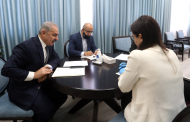Premier Mohammad Shtayyeh yesterday stated that the declining revenues have dealt a staggering blow to the Palestinian Authority’s budget following the novel coronavirus crisis.
Speaking in the evening daily briefing of the COVID-19 state of emergency, Shtayyeh stated that the novel coronavirus pandemic exacerbated the economic situation, and caused the Palestinian Authority’s (PA) treasury to decline, which increased the budget deficit to about USD $1.4 billion.
“The most significant blow hit the treasury of the Authority from which we pay our financial obligations. The local revenues and clearance revenues declined due to the decrease in the total demand and the decline in sales and production sectors,” he announced.
“The Palestinian budget deficit has become about $1.4 billion (including with the expected donor funds). The predictions are close (per international, local, and government reports) regarding the losses of our national economy and GDP, which amounts to 20% until the end of the year, about $ 3.2 billion,” he added.
Shtayyeh’s government has adopted without delay an austerity emergency budget, and attempted to the deficit.
Touching upon the government’s efforts to fight poverty, Shtayyeh said that the government added 11,000 new families to the list of families receiving social allowance payments and would provide financial assistance to some 40,000 unemployed workers in the West Bank and the besieged Gaza Strip.
“To enable more families to withstand the current situation, we will add 9 thousand new families next month. The total number of families receiving financial assistance will reach 125 thousand families, the vast majority of them is in the Gaza Strip,” he elaborated.
He urged the private sector to contribute to the national fund, Waqfet Izz, to help the government address the economic repercussions of the crisis, and noted that President Mahmoud Abbas announced the allocation of $300 million fund as part of an economy recovery plan for small and medium-sized enterprises that are impacted by the crisis.
He rejected Israel’s decision to deduct NIS 450 million ($128 million) of the Palestinian Authority’s tax revenues in addition to the deduction of NIS 650 million the last year.
“This measure is nothing but theft and real piracy of our money and resources. It puts us in a challenging financial situation and adds to our budget deficit. This means that Israel annually deducts one billion and 130 million NIS from our money,” he said.
“We will file complaints to international courts against this procedure and demand that the Israeli side stop all its measures,” he added in this regard.
He also condemned Israel’s illegal plan to apply sovereignty over, or in other words to annex, the Jordan Valley and the illegal colonial settlements in the occupied West Bank, and stressed that this plan, among other measures, such as home demolitions and arrests, “all aim at one thing: to hit hard and weaken the Palestinian institutions and to undermine the possibility of a Palestinian state in the future.”
He welcomed the European Union’s position and the positions of Arab and friendly countries in rejecting the Israeli illegal annexation plan.






